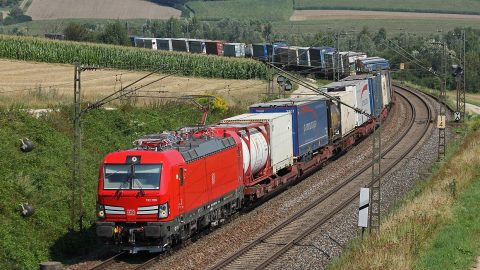
DB Cargo’s figures deep red in 2019
DB Cargo recorded a loss (EBIT) of 308 million euros last year. That was considerably higher than in 2018, when the deficit reached 190 million. DB Schenker did well last year. This is evident from the figures published by parent company Deutsche Bahn on Thursday.
Nearly all indicators in DB’s rail freight branch were red last year. EBIT, EBITDA and turnover as well as the number of tonnes transported and the number of tonne-kilometers decreased. The only bright spot was punctuality, which rose very slightly.
Revenue
DB Cargo’s turnover amounted to 4.45 billion euros last year. That was slightly less than the 4.46 billion from a year earlier. The volume transported also decreased by 9.2 per cent to 232 million tonnes. The number of tonne-kilometers also declined, although that decrease was somewhat less sharp (-3.7 per cent).
It is no surprise that the company has written red numbers in 2019. For years, the freight transport division of the German state-owned company has been unable to get black numbers under the line. Also common knowledge is that DB Cargo’s freight volume has been declining since 2011. This is because the company has not been able to benefit from the growth of rail freight transport in Europe over the past decade.
Irritation
These persistent losses now amount to more than a billion. These losses are usually absorbed by the revenues from passenger transport, which frustrates other rail operators. They see this as cross-subsidisation. Frustration has also been expressed about the fact that Berlin sometimes helps to close financial gaps. They consider this to be state aid.
The politicians themselves are not happy with the way things are going and are therefore expressly involved in the policy at the head office on Potsdamer Platz.
For example, at the request of traffic minister Andreas Scheuer, financial chief Alexander Doll, also head of DB Cargo, had to leave last year. He was succeeded by Sigrid Nikutta.
Wagonload transport
The main cause of the losses is the wagon load transport segment. DB Cargo collects small loads from production centers and bundles these loads to make a complete freight train. This activity accounts for roughly a third of the total volume, but involves a lot of costs.
Figures for the first quarter of 2020 are not yet available. But German State Secretary for Transport Enak Ferlemann said earlier this month that the figures at DB Cargo are unlikely to improve this year. He then spoke of “a tense business situation.” And then the corona problems had yet to come.
DB Schenker ensures good results
Where DB Cargo has been in the doldrums for quite some time, DB Schenker is doing well. Over the past year, it realised a profit before tax and interest (EBIT) of 538 million euros. That was 7 per cent more than the 503 million the year before.
Turnover also plummeted, albeit at a minimum, from 17.05 euros to 17.09 billion euros. That meant an increase of 0.2 per cent. The Ocean Freight and Contract Logistics divisions performed particularly well, with turnover increases of 5.5 and 4.3 per cent respectively. The airfreight department did experience a contraction of 6.9 per cent.




